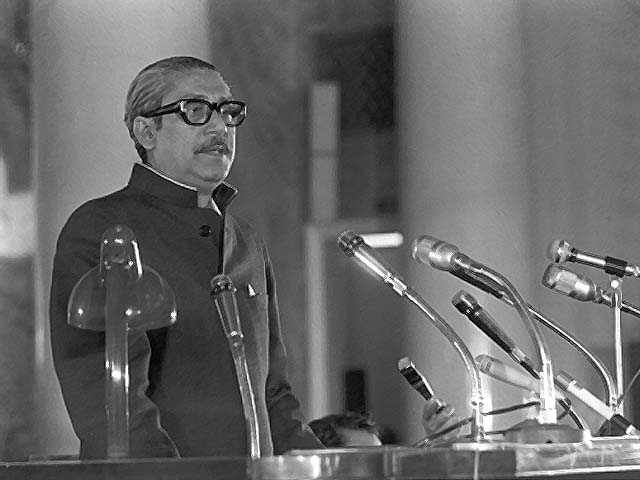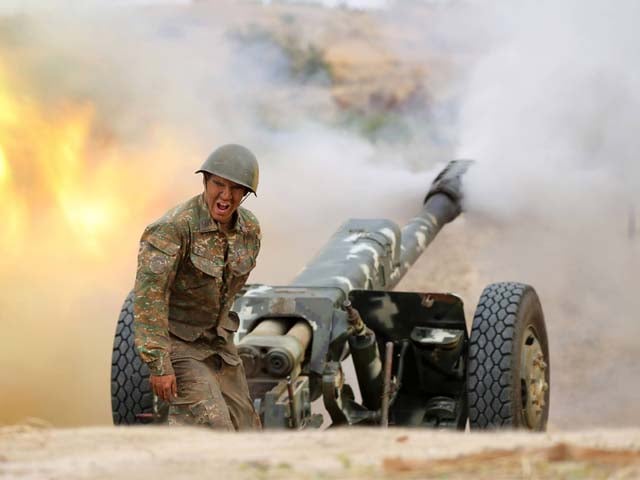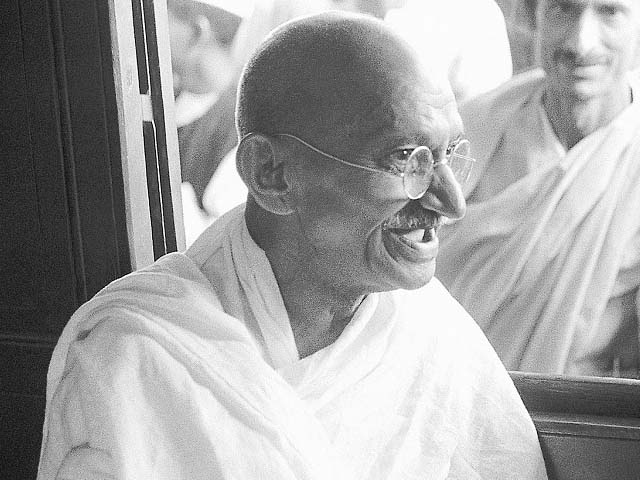
Fahmida Riaz’s dirge for Sheikh Mujibur Rahman reflects the tragedy of a nation
Bangladesh emerged on the world map in December 1971 as the youngest nation in South Asia, as the result of a war of national liberation against the then-West Pakistani ruling elite. In almost five decades of its independence, it has achieved an enviable position in terms of literacy, poverty alleviation, health, population control and women empowerment, putting its larger cousins in South Asia, India and Pakistan, to shame. In recent years, attacks on freethinkers notwithstanding, Bangladesh has made noticeable strides in controlling the power of religious fundamentalism and the army, the former of which continues to threaten Indian state and society, while both are rampant in Pakistan. Next year in 2021, the fiftieth anniversary of Bangladesh’s independence will be celebrated.
Sheikh Mujibur Rahman (1920-1975), who was born a hundred years ago this March and assassinated in a palace coup 45 years ago today, is regarded as the founding father of Bangladesh. He shares some remarkable traits with Pakistan’s own founding father Muhammad Ali Jinnah, as well as his own Pakistani contemporary Zulfikar Ali Bhutto. Both Rahman and Bhutto wanted to steer their countries in new directions; both were charismatic, pro-socialist and had a remarkable rapport with their people. Both would be cut short in their aims by coups and executions shortly after coming to power. In fact, the period from 1977 to 1984 was catastrophic for the three largest countries of South Asia since Bhutto, Rahman, and India Prime Minister Indira Gandhi were all assassinated or executed during this time, leading to profound political and social consequences for these countries.
Rahman led Bangladesh for only four years prior to his ouster from power and subsequent assassination. The great feminist and socialist poet Fahmida Riaz engaged with Bangladesh and the nature of political violence there in her novel Zinda Bahar Lane. But even before that she wrote a deeply moving dirge on the assassination of Rahman in 1975, which is rare for Pakistani poets given the animosity between both countries in the aftermath of the emergence of Bangladesh in 1971. The poem titled Akela Kamra (The Lonely Room) is part of her collection Dhoop (Sunlight) consisting of her poems from 1973 to 1977, and was published after her return home from London in 1976. A manner of political consciousness and protest is prominent in these poems and a conscious attempt has been made to bring the language of poetry nearer to Sindhi and conversational Hindi.
It begins with a musing on isolation and solitude, which Riaz might have been facing herself, after the breakdown of her first marriage during the same period,
‘Han, abhi akelapan hai
Tanhai ki uljhan hai’
It then proceeds to sketch a scene which is familiar to Pakistanis, of jackboots taking over everything, so much so that even the gods have changed, the new and only god being the ‘tank.’ She concluded the poem by comparing the isolation and loneliness with the subsequent suffocation which is a hallmark of army rule, achieving a rhythmic and lyrical balance with akelapan, uljhan, dhun and ghutan, which basically feed of each other when democracy is trampled by authoritarianism.
‘Aur tank ke peeche dhun hai
Is des main badi ghutan hai’
Here’s a chilling concluding thought before I present my original English translation of Riaz’s poem below: Sheikh Mujibur Rahman might have felt the same isolation and suffocation at that fateful hour after midnight when he was shot in his room, 45 years ago today.
~
The Lonely Room by Fahmida Riaz
‘Yes, still there is isolation
The solitude is a confusion.
When they quietly make a spectacle
And quietly hear the fable
Once again under the army’s boot
Is Bengal’s wounded land
And all the thieves of the country
These beaten pawns
Will be seen rejoicing in celebration
And playing the clarion
It is nauseating
And this thought arriving
That in the room there is great suffocation
A hushed confusion.
But outside that room
The cloud roars with a boom
How it rains to bits
The roads reduced to mists
As if thinking
The time which has passed in the world has moulded
A new silver utensil
The deeds of lives have melted
All beliefs and religions have melted
Now the face of belief is new
All the disguises are new
From mosque to mosque these worshippers
Themselves lying prostrate, these conquerors
Should they look by raising their neck
Or evade sight just to check
Where the foreheads are bowed
How come there lies the house of God
No place for prayer in that direction
And no mullah is present on the rostrum
This is actually a tank standing.
And behind the tank is a melody
There is great suffocation in this country.’




COMMENTS (3)
The worst periods in Pakistan's history have been due to the short sighted policies and mismanagement of military dictators, not politicians no matter how inept. Everything that has to do with the tragedy of 1971 has to do with self delusional generals who were too busy drinking and womanizing instead of managing the country. Yahya Khan and Tikka Khan are examples of the worst leadership the country could have had at that time and the clever Indians were only too happy to oblige our nation which couldn't fight so far away in the jungles of Bengal.
Why blame army alone in Pakistan for all the ills. Bhuttos; Shareefs and Zardaris of this country are all to blame like Mamdoots Tiwanas and civil bureaucracy they all share responsibility in diverting Pakistan from the democratic path as envisaged by Jinnah.
The people of Pakistan,for long, has been listening the commitments on civil supremacy from the political parties.Civilian supremacy,infact, does not stem from the electoral process but the trust of civilians on civilian governments .Calling out the Army and its affiliated institutions to clear the inundatory roads gives clear and loud message to the sphere ,who always remains in the search of folding the process , that the civilian governments are incapable to clear the roads .Wheras krachiites are welcoming the move of Pm Imran khan of calling out NDMA to deal with the urban flooding,it would be unacceptable for the ones who want the process to flourish.Here the civilian owners of Karachi are in hurry to put the burden of their inefficiencies on the NDMA ,but the implications of these moves will unfortunately gives more strength to the critics of democracy and civilian supremacy in Pakistan . Karachi,the crown jewel of Pakistan, will be the case point,where from providing security to cleaning the roads will be done by the Army .The utter failure of governance in Karachi is inviting the Army again in the governance of the metropolitan cities.Moreover,the dependency of the civilian governments on the Army flushes out the weak political structure ,which is based on feudalism and nepotism .In a nutshell,in amateur democracies like Pakistan the interest groups play on the fault lines left by civilian governments to maintain dependency syndrome . #Karachi
Comments are moderated and generally will be posted if they are on-topic and not abusive.
For more information, please see our Comments FAQ